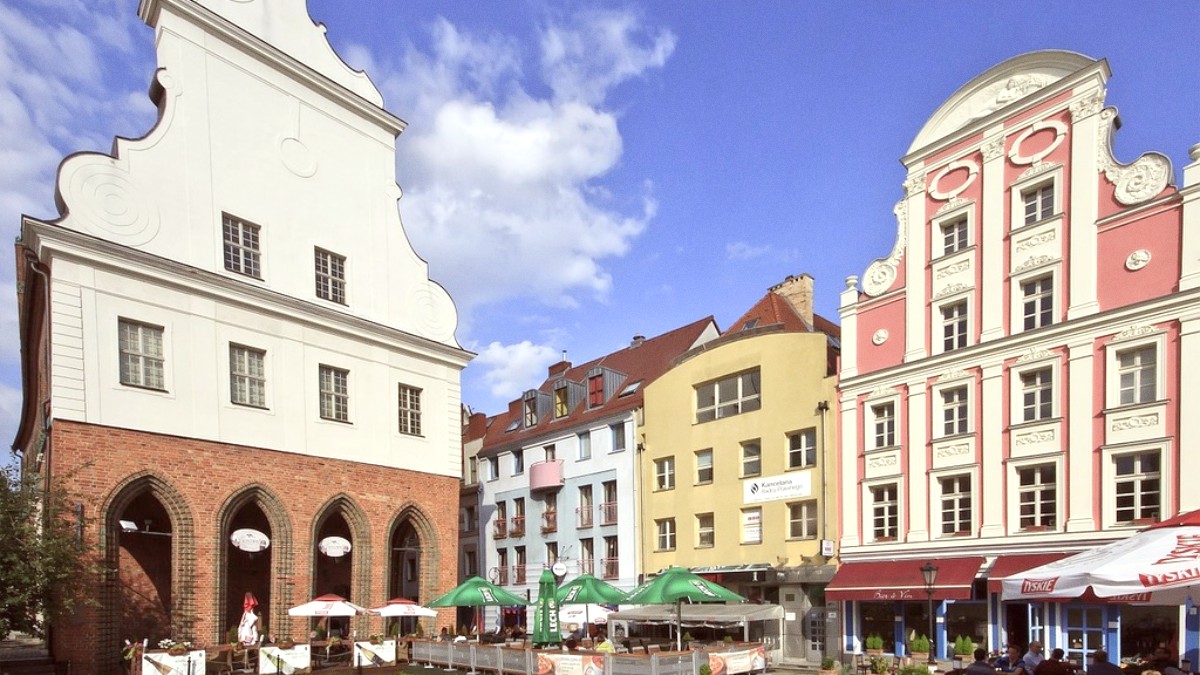
Pomerania, Poland
Szczecin experiences a temperate climate with four distinct seasons, each offering a different atmosphere. Layering clothing is a good approach for much of the year.
Spring (April-May) has mild temperatures and increasing sunshine. Summer (June-August) is the warmest, with long daylight hours. Autumn (September-October) cools, with beautiful foliage. Winter (November-March) brings cold, often freezing temperatures and snowfall.
High Season (June to August) presents the warmest weather and longest daylight hours. Attractions operate at full capacity. Higher prices for accommodation and flights are typical, and crowds are larger.
Shoulder Season (April-May and September-October) has pleasant weather with fewer crowds and lower prices. Spring brings blooms, while autumn offers colorful foliage. Low Season (November to March) has the lowest prices and minimal tourist numbers, but prepares for cold weather and short daylight hours.
Pack for heatwaves in summer and severe cold in winter.
Stay hydrated and seek shade during the hottest parts of the day. Occasional heatwaves occur.
Szczecin winters get very cold, with snowfall and icy conditions. Pack suitable winter gear.
Late spring to early autumn (May-September) are the best for walking tours, parks, and landmarks.
July and August are ideal for kayaking, sailing, and swimming on the Odra River.
Festivals and markets throughout the year.
Many outdoor festivals peak during the summer. Check local listings for dates.
Late November through December offers Christmas markets and festive atmosphere.
Poland belongs to the Schengen Area, simplifying travel for many nationalities within Europe. Non-EU/EEA citizens typically need a Schengen visa for stays up to 90 days within any 180-day period. Apply at the embassy or consulate of your main destination country.
Citizens of many countries enter Poland and the entire Schengen Area for up to 90 days without a visa for tourism or business. This group includes citizens from the United States, Canada, Australia, New Zealand, and the United Kingdom. Always verify current regulations with the Polish Embassy or Consulate in your country before travel.
Valid for at least three months beyond your departure from Schengen, issued within 10 years, two blank pages.
Properly stamped in your passport.
Confirmed tickets showing departure from Schengen.
Evidence of enough money for your stay.
Minimum coverage of €30,000 for emergencies and repatriation.
Plan your budget for a Szczecin trip to avoid surprises. Costs vary depending on your travel style, from budget-conscious backpacking to luxurious stays. Poland uses the Polish Złoty (PLN).
ATMs are widely available in Szczecin. Major credit and debit cards are accepted in most hotels, restaurants, and larger shops. Smaller shops or market stalls might prefer cash, so carry some Złoty.
Tipping is common in Poland, though usually less than in some Western countries. Service charges are rarely included in restaurants.
Hostel dorm bed: 60-100 PLN. Mid-range 3-star hotel: 180-350 PLN. Street food: 15-30 PLN. Mid-range restaurant meal: 40-80 PLN. Single public transport ticket: 4.00-6.00 PLN. Museum entrance: 10-30 PLN.
Prioritize your health and safety during your Szczecin visit. Poland is generally a safe country, but being informed for any situation is good.
No specific vaccinations are necessary for entry to Poland. Routine vaccinations, Hepatitis A and B, and Tetanus are recommended for most travelers.
Consult a healthcare professional or travel clinic at least 4-6 weeks before your trip for personalized advice.
Poland has an universal healthcare system. EU citizens use EHIC. Non-EU citizens should obtain comprehensive travel medical insurance for emergencies and evacuation.
Hospitals: Szpital Kliniczny nr 1, Szpital Wojewódzki w Szczecinie.
Emergency Numbers: 112 (EU-wide), 997 (Police), 998 (Fire), 999 (Ambulance).
Tap water in Szczecin is generally safe to drink. Restaurants and food establishments conform to EU hygiene standards. You can confidently enjoy local and international cuisine.
Tap water is safe; bottled water is also available if preferred.
Practice good food hygiene, especially with street food. Choose vendors with high turnover.
Szczecin is a safe city for travelers. Petty crime, like pickpocketing, can occur in crowded tourist areas or on public transport. Remain vigilant and secure valuables.
Use a Money belt or an RFID-blocking wallet. Avoid displaying large sums of cash.
Nightlife: Exercise caution, avoid walking alone in unlit areas. Use reputable taxis.
| Category | Description | Recommendation |
|---|---|---|
| Medical Coverage | Medical emergencies, hospitalization, and emergency medical evacuation. | Highly recommended for all visitors, especially non-EU citizens. |
| Trip Protection | Cancellation, interruption, or delay coverage. | Valuable for unexpected changes to travel plans. |
| Personal Belongings | Lost, stolen, or damaged luggage and personal items. | Consider this for valuable items. |
These resources are available to ensure your health and safety in Szczecin.
First aid supplies for travelers, essential for minor injuries.
Consumer site for water filtration products, useful for outdoor activities.
Anti-theft bags and travel security products for securing your belongings.
Know Your Rights
If your flights are delayed or canceled, you may be eligible for compensation under EU regulations.
AirHelp assists passengers in receiving up to €600 in compensation for delayed or canceled flights. This service streamlines the compensation claim process.
Commission Rate: 15-16.6% | Cookie Duration: 45 days
Travel health regulations can change quickly. Stay informed by checking official sources.
During heatwaves, drink plenty of water and seek shaded areas to stay cool.
If hiking in forests, inspect your body and clothing for ticks and remove them promptly.
Be ready for unexpected situations. Knowing what to do and who to contact is .
A robust policy covering emergencies, hospital visits, and possible evacuation.
Sufficient supply in original packaging, with a doctor's letter for controlled substances.
Band-aids, antiseptic, pain relievers, antihistamines for minor ailments.